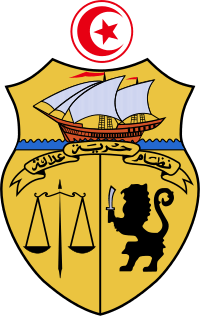Chamber of Deputies (Tunisia)
| Chamber of Deputies مجلس النواب Majlis an-Nuwwāb | |
|---|---|
 | |
| Type | |
| Type |
Lower house of the Parliament of Tunisia |
| Leadership | |
President |
Sahbi Karoui (a. i.) |
| Website | |
|
www | |
 |
| This article is part of a series on the politics and government of Tunisia |
|
Judiciary |
| Foreign relations |
The Chamber of Deputies (Arabic: مجلس النواب Majlis an-Nuwwāb, French: Chambre des députés) was the lower chamber of the Parliament of Tunisia, the bicameral legislative branch of the government of Tunisia. It has 214 seats and members are elected by popular vote to serve five-year terms. 20% of the seats are reserved for the opposition. Elections are held in the last 30 days of each five-year term. To be eligible for office, one must be a voter with a Tunisian mother or father and be at least 23 years old the day candidacy is announced.[1] Elections were most recently held in October 2009.
Under the original Tunisian constitution, the Chamber of Deputies theoretically possessed great lawmaking powers, and even had the right to censure the government by a two-thirds majority. In practice, the body was dominated by the Democratic Constitutional Rally (formerly the Neo-Destour Party and Socialist Destour Party) from independence until the 2011 Tunisian revolution. The Neo-Destour won every seat in the Chamber at the first elections in 1959. From then on, Tunisia was effectively a one-party state, even though opposition parties nominally remained legal until 1963. Even after opposition parties were legalized again in 1981, they did not manage to enter the Chamber of Deputies until 1994. Even then, in the five elections held before the overthrow of President Zine El Abidine Ben Ali in 2011, they never accounted for more than 19 percent of the total seats in the chamber. During the last few years of Ben Ali's tenure, the chamber took an increased role in debating national policy. However, all legislation still originated with the president, and there was little meaningful opposition to presidential decisions.
The 2009 election yielded the following results:
| Parties | Votes | % | Seats | +/− | |
|---|---|---|---|---|---|
| Constitutional Democratic Rally | 3,754,559 | 84.59 | 161 | +9 | |
| Movement of Socialist Democrats | 205,374 | 4.63 | 16 | +2 | |
| Popular Unity Party | 150,639 | 3.39 | 12 | +1 | |
| Unionist Democratic Union | 113,773 | 2.56 | 9 | +2 | |
| Social Liberal Party | 99,468 | 2.24 | 8 | +6 | |
| Green Party for Progress | 74,185 | 1.67 | 6 | +6 | |
| Ettajdid Movement | 22,206 | 0.50 | 2 | −1 | |
| Democratic Forum for Labour and Liberties | 5,329 | 0.12 | 0 | — | |
| Progressive Democratic Party | 1,412 | 0.03 | 0 | — | |
| Independent lists | 11,552 | 0.26 | 0 | — | |
| Valid votes | 4,438,497 | 99.80 | 214 | +25 | |
| Blank or invalid votes | 8,891 | 0.20 | |||
| Total | 4,447,388 | 100.00 | |||
| Voter turnout | 89.40 | ||||
| Electorate | 4,974,707 | ||||
| Source: POGAR, (French) Business News | |||||
See also
References
- ↑ Dahmène Touchent (August 2005). "A Guide to the Tunisian Legal System". New York University School of Law. Retrieved 3 November 2010.